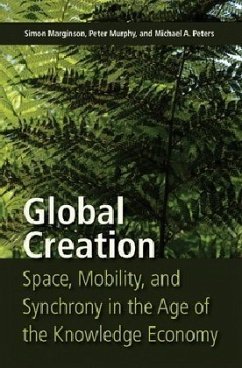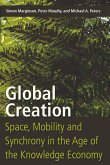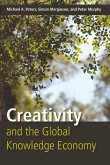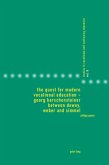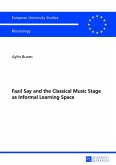This lively and original book changes the way we see globalization and the knowledge economy. Creativity, exchange and the open flow of ideas have long shaped states, economies and everyday life. But knowledge now has an extraordinary dynamism. The world is crisscrossed by traffic in people, data and images. A world society is emerging, though governance is yet to reflect this. Global Creation shows that global creativity is transforming in two ways. First, global synchrony and convergence are changing the conception, production and sharing of creative work and this is feeding back into the core structures of the social world. Second, the global dimension is itself a human product and one that is continually being created. This book explores acts of imagining, producing and regulating the global dimension of action in the past, present and future. It will interest all intelligent readers, particularly those engaged with the history of ideas, political economy, sociology, innovation, or business organization. It follows Creativity and the Global Knowledge Economy (Peters, Marginson, Murphy 2009), also published by Peter Lang.
"'Global Creation' travels through history and place to explore the spread of knowledge and ideas. This innovative volume demonstrates the importance of new communications technology - and its limits. More students than ever travel to study, despite the online alternatives. Cities remain crucial sources of creativity, as they have for centuries. Global forces reshape the cultures and economies of campuses and cities rather than reduce their significance. 'Global Creation''s distinguished authors bring research, experience and reflection to a timely and compelling set of contemporary questions." (Glyn Davis, Vice-Chancellor, University of Melbourne, Melbourne, Australia)
"Marginson, Murphy and Peters have created a tour de force on globalization. They have broken away from analyses that are in the moment, as if globalization is a late 20th century invention, and instead offer an erudite read on a complex topic. I know of no other studies of the topic that begin with a synopsis of Mozart's work and also take into account the terrifying firestorms in Australia in 2009. The authors move back and forth in history to fortify their analyses that globalization is both an extension and disruption of the past. The authors perform a narrative high wire act for the readers, and we come away thrilled, wanting more." (William G. Tierney, University Professor, University of Southern California, Los Angeles, California, USA)
"This is a book of enormous significance: it highlights the importance of creativity in the new knowledge economy, and shows how cross-border flows of people, capital and knowledge are re-shaping the global architecture of science, research and education. It describes the communicative conditions that are entailed in 'making the global'. Rejecting the temptation to close borders, Marginson, Murphy and Peters argue convincingly that the current global financial crisis demands, more than ever, open collaborative spaces in which to realize the creative potential of the global age characterized by a diversity of cultural forms, as well as the processes of hybridization and critical reflexivity." (Fazal Rizvi, Professor, Department of Educational Policy Studies, University of Illinois at Urbana-Champaign, Illinois, USA)
"This second book in the trilogy on creativity in the age of the knowledge economy could not be timelier. At the point when the world is in the midst of the first truly global economic recession, the authors set out to document the history of the 'global dimension'. In 'Global Creation', Marginson, Murphy and Peters focus on how time and space are compressed by the global knowledge economy and identify the emergence of a 'universal mind'. In this most ambitious endeavor, the reader is taken on the historical journey of the global dimension of action, a dimension that each year is larger and more visible. Simultaneously our world becomes more complex and simpler. The authors invoke the Bourdieuian concept of 'field' to have us imagine a global territory in which the competition for dominance is housed in the potential for creativity. The circulation of knowledge is shaped by the dialectic between continuity and discontinuity, between homogeneity and heterogeneity. Yet within the struggle for power, the inequalities of access and the continuing maldistribution of resources, the authors conclude that we enjoy an enlarged freedom to create. The story they tell from the earliest times to the present day documents how the invisible has become visible. They posit the idea that the visible global dimension of action provides us with an unprecedented opportunity in world history to use knowledge and creativity to construct a better, more open world." (Donald Fisher, Co-Director, Centre for
"Marginson, Murphy and Peters have created a tour de force on globalization. They have broken away from analyses that are in the moment, as if globalization is a late 20th century invention, and instead offer an erudite read on a complex topic. I know of no other studies of the topic that begin with a synopsis of Mozart's work and also take into account the terrifying firestorms in Australia in 2009. The authors move back and forth in history to fortify their analyses that globalization is both an extension and disruption of the past. The authors perform a narrative high wire act for the readers, and we come away thrilled, wanting more." (William G. Tierney, University Professor, University of Southern California, Los Angeles, California, USA)
"This is a book of enormous significance: it highlights the importance of creativity in the new knowledge economy, and shows how cross-border flows of people, capital and knowledge are re-shaping the global architecture of science, research and education. It describes the communicative conditions that are entailed in 'making the global'. Rejecting the temptation to close borders, Marginson, Murphy and Peters argue convincingly that the current global financial crisis demands, more than ever, open collaborative spaces in which to realize the creative potential of the global age characterized by a diversity of cultural forms, as well as the processes of hybridization and critical reflexivity." (Fazal Rizvi, Professor, Department of Educational Policy Studies, University of Illinois at Urbana-Champaign, Illinois, USA)
"This second book in the trilogy on creativity in the age of the knowledge economy could not be timelier. At the point when the world is in the midst of the first truly global economic recession, the authors set out to document the history of the 'global dimension'. In 'Global Creation', Marginson, Murphy and Peters focus on how time and space are compressed by the global knowledge economy and identify the emergence of a 'universal mind'. In this most ambitious endeavor, the reader is taken on the historical journey of the global dimension of action, a dimension that each year is larger and more visible. Simultaneously our world becomes more complex and simpler. The authors invoke the Bourdieuian concept of 'field' to have us imagine a global territory in which the competition for dominance is housed in the potential for creativity. The circulation of knowledge is shaped by the dialectic between continuity and discontinuity, between homogeneity and heterogeneity. Yet within the struggle for power, the inequalities of access and the continuing maldistribution of resources, the authors conclude that we enjoy an enlarged freedom to create. The story they tell from the earliest times to the present day documents how the invisible has become visible. They posit the idea that the visible global dimension of action provides us with an unprecedented opportunity in world history to use knowledge and creativity to construct a better, more open world." (Donald Fisher, Co-Director, Centre for
